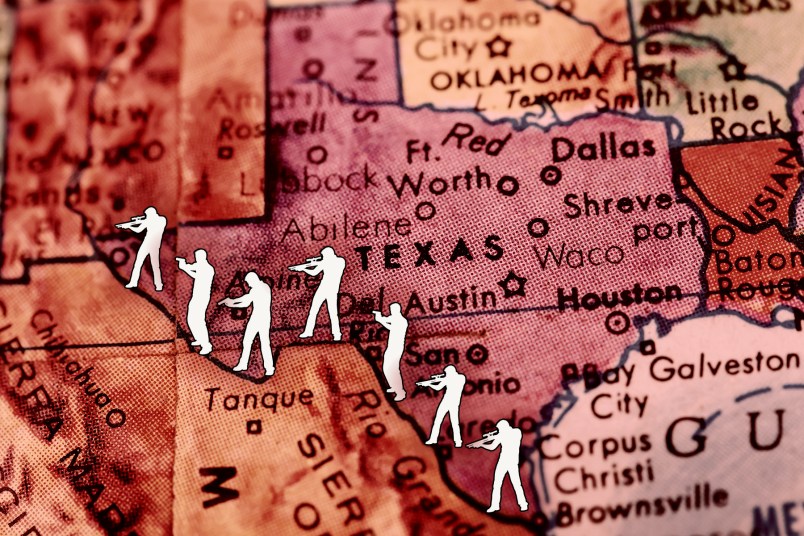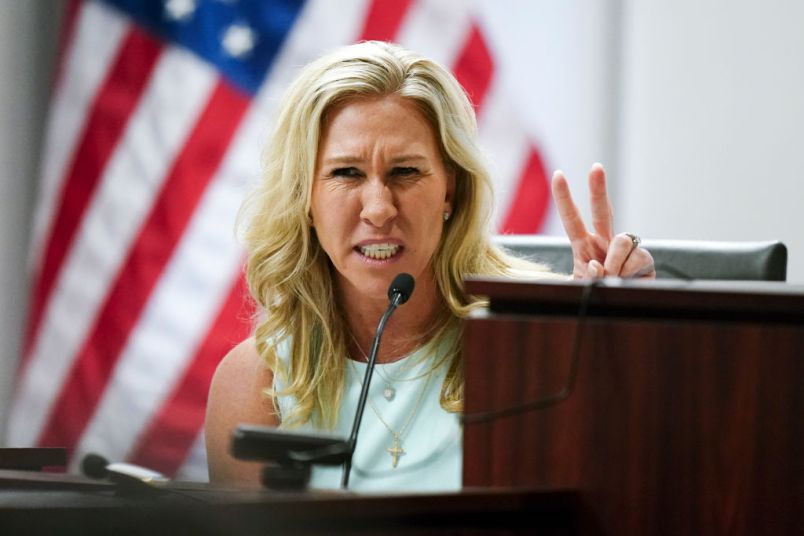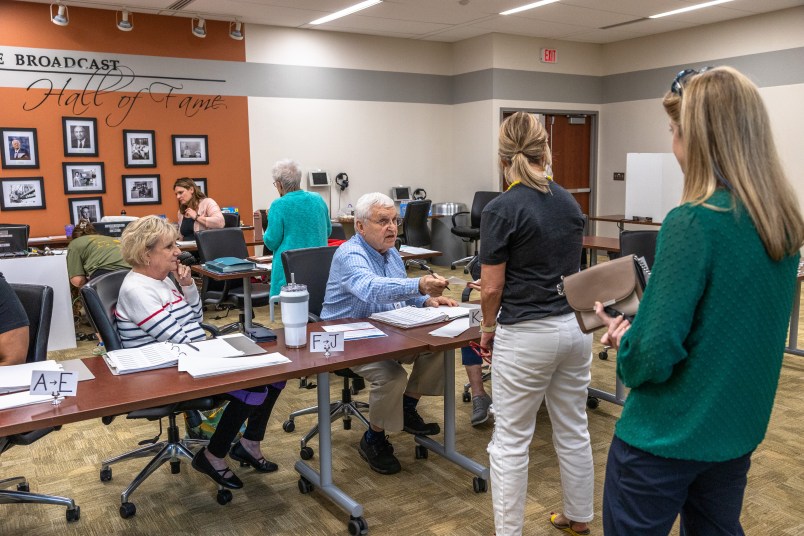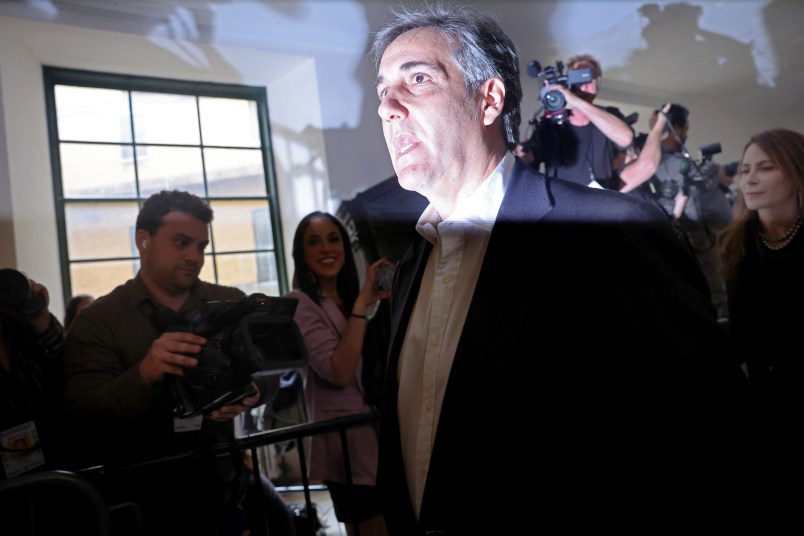Over the past two years, Texas Gov. Greg Abbott has championed his own brand of aggressive border enforcement.
Now, state legislators are considering a smattering of legislation that would annex authority to enforce immigration law away from the federal government and hand it to the state.
One of the most extreme proposals would give Texas officials the power to “repel” and “return” undocumented migrants crossing in from Mexico, a power currently reserved for the federal government, affirmed most recently by a 2012 Supreme Court decision.
But with this new package of laws and a federal judiciary stacked for the right wing, that all may change.
“Texas has been one of the states ready and willing to test the boundaries of federal immigration law,” Alexis Lucero, an El Paso immigration attorney, told TPM. “They don’t mind if they step on the toes of the administration, step on possible human rights violations, as long as they get their day in court and present their side to a potentially sympathetic ear.”
That extreme proposal — HB 20 — would create a state-run “Border Security Unit,” empowered to deport undocumented migrants to Mexico if they are seen crossing the border, and establish a 10 year maximum prison sentence for crossing into Texas illegally. The bill would also allow the unit to deputize civilians into its ranks, grant its employees criminal and civil immunity, and allow local magistrates to set electronic tracking as a condition for bond release on misdemeanor trespass — a charge that, under Abbott’s Operation Lone Star, has led to thousands of migrants being arrested.
It’s not clear that HB 20 will pass in its current form. But Texas House Speaker Dade Phelan (R) has said that passing it is a priority, and the bill lists more than half of the Texas House Republican caucus as co-sponsors. It comes alongside other proposals in the state Senate to empower federal Customs and Border Patrol officers to enforce state law. Another Senate proposal, championed by Texas Lt. Gov Dan Patrick (R), would criminalize crossing the border at the state level.
‘Invasion’
Gov. Abbott launched Operation Lone Star in March 2021, as the Biden administration came in and began to review and in some cases roll back Trump’s hard-right border policies.
Under Operation Lone Star, Texas has spent billions of dollars in funds that were at least partly drawn from federal COVID relief aid to detain migrants on trespassing charges, plan to build 40 miles of wall, and deploy national guard troops in a controversial show of force along the southern border.
Abbott has cast the policy as a response to an “invasion” from Mexico, and as an effort to stem the tide of drug imports and cartel violence. Photoshoots alongside state-funded portions of wall, images of national guard troops along the Rio Grande, and statistics on hundreds of thousands of arrests of illegal immigrants for local trespassing offenses have become a cornerstone of the governor’s messaging operation. Fox News Host Tucker Carlson pressed Abbott in December to “block” the border, describing the situation as an “invasion.”
As with many policy pushes on the right, it’s not entirely clear where media preening ends and real changes to daily life begin. But the new legislative proposals grow out of the contention that a foreign “invasion” of the United States is underway, and must be repelled.
Shari Randall, director of state and local engagement at the Federation for American Immigration Reform, which has supported the proposals, told TPM that the proposals were a justified response to an “invasion” taking place from Mexico.
“HB 20 is needed because the Biden administration has abdicated its role to protect American citizens and our nation’s sovereignty,” Randall wrote in an email to TPM.
FAIR has been described by the Southern Poverty Law Center as an anti-immigrant hate group, and has not been shy in the past at taking swipes at conservative politicians which it regards as too welcoming of immigration. Founded by white nationalist John Tanton, FAIR has promoted the idea of a “crisis” at the U.S.-Mexico border in recent years, helping to foment the atmosphere into which Operation Lone Star has stepped.
The group wholeheartedly supports the Texas proposals, saying that they’re a reaction to the Biden administration “not fulfilling its duties to U.S. citizens and the states” to protect them against foreign invasion.
In 2012, the Supreme Court struck down a 2010 Arizona law, SB 1070, which allowed state police to apprehend undocumented immigrants, saying that it violated the Constitution’s supremacy clause. The more extreme Texas House proposal relies instead on the “invasion” justification, which would supposedly allow the the law to go forward.
“The invasion clause can be invoked by the states and is not subject to federal immigration law,” Randall argued.
The details
In Texas House, two proposals have drawn attention: one, HB 7, would establish a fund to pay landowners along the border for property damage, expand court infrastructure for border issues, and create a legislative oversight committee to further study the issue.
That’s the moderate option, Roberto Lopez of the Texas Civil Rights Project told TPM. Lopez described the more extreme “Border Protection Unit” bill, HB 20, as a “bit of a smokescreen” for the more moderate HB 7. An Abbott spokeswoman didn’t return TPM’s request for comment on whether he supports the proposals.
The Border Protection Unit proposed by HB 20 would be allowed to deputize locals into enforcing the border, an issue that Lopez described as an invitation to have local militias participate directly in law enforcement.
He said that it’s partly out of a desire to save money that the proposals are being considered, as the federal COVID aid dollars which funded much of Operation Lone Star begin to run out.
“What the speaker was talking about was saving money,” Lopez said of Speaker of the House Phelan. “He thought he could do Operation Lone Star lite.”
The Border Protection Unit would also be given responsibility for building the U.S.-Mexico border wall first championed by Trump, and would be entrusted with negotiating land easements for the barrier.
Charles Tiefer, a government contracting and procurement expert at the University of Baltimore School of Law, described HB 20’s provisions to TPM in an email as an “invitation to extreme incompetence; or intimidation of landowners, especially poor ones; or, both.”
Other proposals under consideration would also arrogate border enforcement to Texas. The Senate bill supported by Lt. Gov. Patrick would establish a prison term of up to two years if a migrant was caught entering illegally a second time, and establish a life incarceration term if the person had a previous felony conviction.
The courts
Observers and activists in Texas described the bills as a mixture of right-wing media posturing, real attempts at policy, and a broader effort to take advantage of a rightward shift at all levels of the judiciary.
The 2012 Arizona ruling was the last time that the Supreme Court addressed the question of whether the states could impinge on federal border enforcement authority head on. But, the Texas Tribune reported, Texas First Assistant Attorney General Brent Webster told state senators at a hearing last year that Attorney General Ken Paxton (R) disagrees with that ruling, and would “welcome laws” which challenge that “because the makeup of the Supreme Court has changed.”
Lopez described the effort as an attempt to “take advantage of the makeup of the Supreme Court, and wrestle control from the federal government so the state could always claim that there’s some sort of emergency invasion, military action, and be able to respond to it however they see fit.”
Federal immigration enforcement, he added, undercut claims from state and national politicians that the border represented a national crisis, or an invasion.
Lucero, the El Paso immigration attorney, regarded the legislation as a potentially dangerous but significant long shot which could still fundamentally change how the states and federal government treat the border.
“Even if we lose the battle, we gain an inch,” he said of the mindset.










